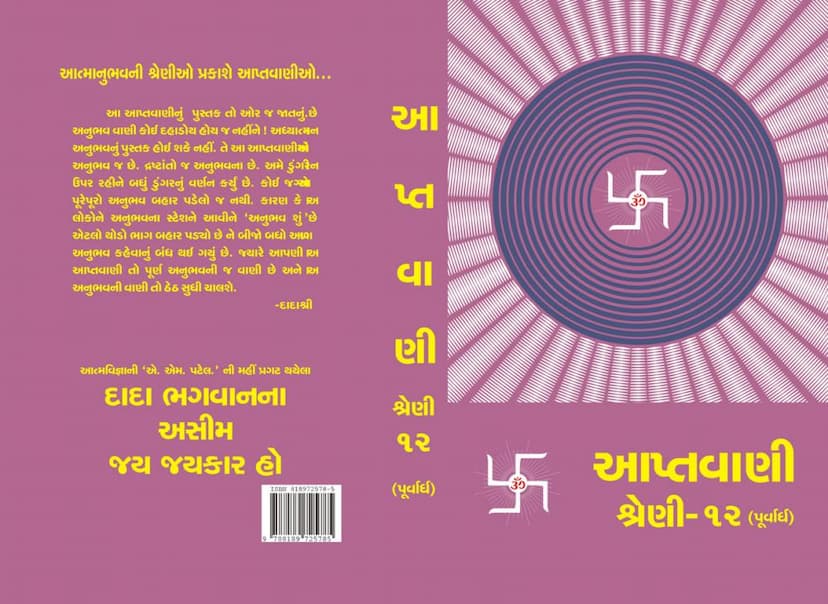Aptavani 12 P
Added to library: September 1, 2025

Summary
Here's a comprehensive summary of the provided Jain text, Aptavani 12 Part 1, by Dada Bhagwan, based on the English translation of the Gujarati text:
Aptavani 12 (Part 1): A Path to Self-Realization and Ultimate Knowledge
This book, Aptavani 12 (Part 1) by Dada Bhagwan, published by Dada Bhagwan Foundation, is a profound spiritual discourse presented through the compilation of Dada Bhagwan's (H.S. Patel) spoken words. It's not a book of mere intellectual knowledge but a direct experience of the Self, a pathway to attaining Keval Gnan (Omniscience) for Mahatmas who have received Self-Realization through the Akram path.
Core Message: Experiencing the True Self
The central theme is the realization of one's true nature as the Pure Soul (Shuddhatma), distinct from the physical body, mind, and ego. Dada Bhagwan emphasizes that the visible 'Dada Bhagwan' is not the God, but rather the enlightened entity residing within, the master of the fourteen worlds, who is also present in everyone, though latent. He clarifies that he himself is not God but a Gnani Purush (Knower of the Self), and he bows to the Dada Bhagwan manifested within him.
The Akram Path: The Direct Route to Liberation
Dada Bhagwan describes the Akram path as a direct, "lift" route to Self-Realization, in contrast to the "kramik" (step-by-step) path. This Akram path, facilitated by his unique "Gnan Kriya" (Knowledge-Action), allows individuals to realize their true Self in just two hours.
Key Concepts and Practices:
The book delves into several fundamental concepts and practices essential for spiritual progress on the Akram path:
- Self-Awareness (Jagruti): The paramount importance of constant awareness of what "Chandubhai" (the ego/body complex, representing the reader's self) is doing, thinking, and saying. This awareness is the first step towards identifying with the Self. True Jagruti means seeing one's own faults and not those of others.
- Separation of Self and Non-Self (Bhedgnan): A core teaching is to maintain a constant awareness of the Self (Shuddhatma) as separate from the body, mind, ego, and all other worldly interactions and attachments. This is achieved through constant "seeing" and "knowing" without becoming one with them.
- The Five Self-Transforming Commands (Panch Agna): These commands are the practical guidelines for Mahatmas to remain in the Self and progress towards Keval Gnan. They are considered the essence of the path and the only "tapa" (penance) required after Self-Realization.
- Understanding "Bhageni Bhool" (The Fault of the Engaged): This refers to recognizing that all actions are driven by past karmic impressions (bandhan) and that the current self (Chandubhai) is merely discharging these. The true Self (Shuddhatma) remains unaffected.
- Pratikraman (Self-Correction): When one realizes they have made a mistake or identified with Chandubhai, Pratikraman is the process of apologizing and rectifying the error from the perspective of the Self.
- Pure Use (Shuddha Upyog): This is the highest form of awareness where one remains solely with the Self, unaffected by any worldly phenomenon, and sees the Self in everyone. It's a state of constant, unwavering awareness of the Pure Soul.
- The Power of Pure Intention (Nischay): The book stresses that true progress and spiritual upliftment come not from external actions but from the purity of one's internal intention.
- Detachment (Vitraagta): Experiencing detachment from worldly desires, possessions, and situations, by constantly seeing them as separate from the Self, leads to inner peace and progress.
- Self-Scrutiny through Self-Talk: Dada Bhagwan advocates for regular self-dialogue, gently correcting and guiding the ego (Chandubhai) from the perspective of the Self, as if speaking to a separate entity. This practice helps in maintaining awareness and strengthening the identification with the Self.
- Non-Attachment to Feelings: Recognizing that happiness and sadness are external experiences and not part of the true Self is crucial. One must remain a detached witness to all phenomena.
- Spiritual Vitamins: Adversity and challenges are seen as "vitamins" for the soul, fostering spiritual growth, while favorable circumstances are for the body.
- The Nature of Karma: Karma is explained as the discharge of past impressions. New karma is not created by the enlightened Self, only the discharge of existing karma occurs.
- The Illusion of "I" (Aham): The ego's mistaken identification with the body, mind, and ego is the root cause of suffering. By realizing the "I AM the Pure Soul" (Aham Shuddhatma) truth, this illusion is shattered.
- The Importance of Understanding, Not Just Memorizing: The book highlights that mere intellectual understanding (samaj) is insufficient; it needs to be internalized as belief (pratiti), leading to experience (anubhav), and finally, to living in that state (vartan).
- The Four Types of Use (Upyog): The text categorizes use into impure, inauspicious, auspicious, and pure use, with pure use being the state of being in the Self, free from ego.
- Acceptance of All Situations: The key to maintaining peace and progress is to remain in the Self, accepting all circumstances as external, whether pleasant or unpleasant.
- The Unwavering Self: The Self is described as a detached observer, unaffected by the external world, like a thermometer that measures temperature but is not affected by it.
- The Goal of Self-Realization: The ultimate aim is to reach the state of complete self-awareness, where one is constantly in the Self, free from the influence of the ego and karma.
The Message of Compassion and Purity:
Dada Bhagwan's teachings are filled with compassion and a scientific approach to spiritual liberation. He guides individuals to peel away the layers of ego and ignorance, revealing the pure, unchanging Self that resides within. The book serves as a spiritual guide, offering practical advice and profound insights to aid seekers on their journey towards ultimate knowledge and liberation.